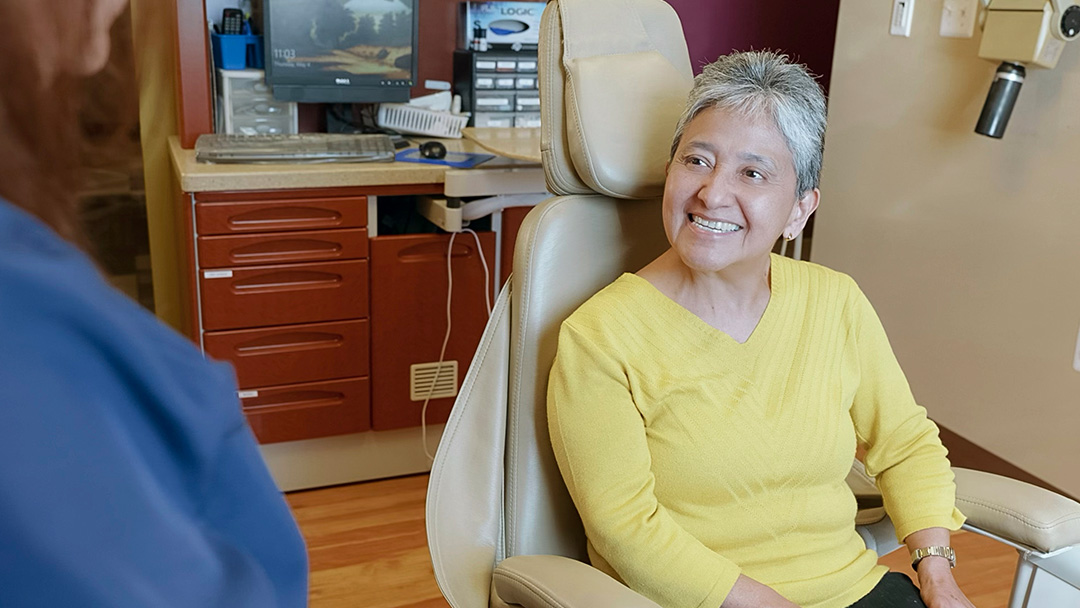No one wants to wake up one morning to discover that they now have a broken or cracked tooth. Though it takes prolonged and consistent teeth grinding to accomplish this scenario, it can happen with enough exerted force. That’s why our Southgate, MI, dentists offer night guards for patients who suffer from nighttime bruxism and want not only jaw relief but tooth protection.
Here’s how a custom night guard can protect your teeth while you rest.
Reasons Behind Grinding or Clenching
Why a patient develops bruxism is not always clear. Most often, grinding or clenching happens due to stress or anxiety. Other known causes may be alcohol use, cigarettes, caffeine, sleep apnea, or a misaligned bite.
Talking with our dentists about your level of stress or lifestyle habits can help uncover the root cause of your bruxism. A more in-depth oral examination will also reveal any damage that has been done as a result of your teeth grinding.
Depending on the degree to which you grind or clench, restorative dental procedures, like dental crowns, may be required to strengthen weakened teeth. Most mild cases of bruxism do not lead to additional dental work, but when needed, our dentist will discuss a treatment plan with you.
Effective Tips for Stopping Teeth Grinding or Clenching
Whether it’s anxiety induced or the result of too much coffee, bruxism can be treated by our dentist and at home. Here are 4 tips that when practiced, can limit the frequency of how much you grind or clench your teeth.
1. Wear a Custom Night Guard
This treatment option is best for patients who suffer from nighttime bruxism and grind or clench while asleep. By wearing the custom-made night guard provided by our dentists, you effectively put a barrier between your top and bottom teeth so they can’t touch. Because of this, the act of grinding and clenching becomes difficult.
Read More → How Night Guards Are a Must-Have for a Healthier Smile
Night guards also help to cushion the jaw muscles if you do clench during the night. When worn, the night guard lessens the tension put on the jaw and prevents pain in the area or loss of tooth enamel.
2. Mindfully Consume Caffeine and Alcohol
While both caffeine and alcohol can be enjoyed in moderation, their consumption can increase the risk of bruxism in some individuals. Take note of how much you have on a regular basis and if needed, cut back to avoid unwanted tooth damage, headaches, jaw pain, and more.
Be sure to also ask our dentists about having a night guard created to give your teeth added protection while you’re sleeping. This will at least prevent grinding or clenching if you do decide to have an extra cup of coffee during the day.
3. Become Aware of Daytime Habits
For those who have a habit of unknowingly grinding or clenching during the work day, try paying attention to when it happens. You might come to realize that you’re clenching a lot when you shouldn’t be and that you have the power to stop if you become aware of what you’re doing.
When you catch yourself grinding or clenching, place the tip of your tongue between your teeth. Practicing this will train your jaw muscles to relax. Don’t get discouraged if it takes a while for this to set in. Just keep trying and it’ll become easier. Your jaw and teeth will thank you!
4. Get in the Relaxation Zone Before Bed
Are you more stressed or anxious than usual? There’s a high chance those feelings are spilling over into your sleep and causing you to grind or clench. To relax before climbing into bed, we recommend trying a stress reduction technique.
This can be meditation, yoga, listening to music, light exercise, or something else. As long as it puts you at ease and calms you down, it should help you sleep more soundly and reduce your bruxism.
Start the Night Guard Process
Custom-made night guards provided by our dentists in Southgate, MI, offer a targeted and effective defense against teeth damage from grinding and clenching. Embracing this personalized solution can safeguard your smile and significantly improve your oral health. Call Northline Dental today at (734) 284-8088 to request an appointment.


